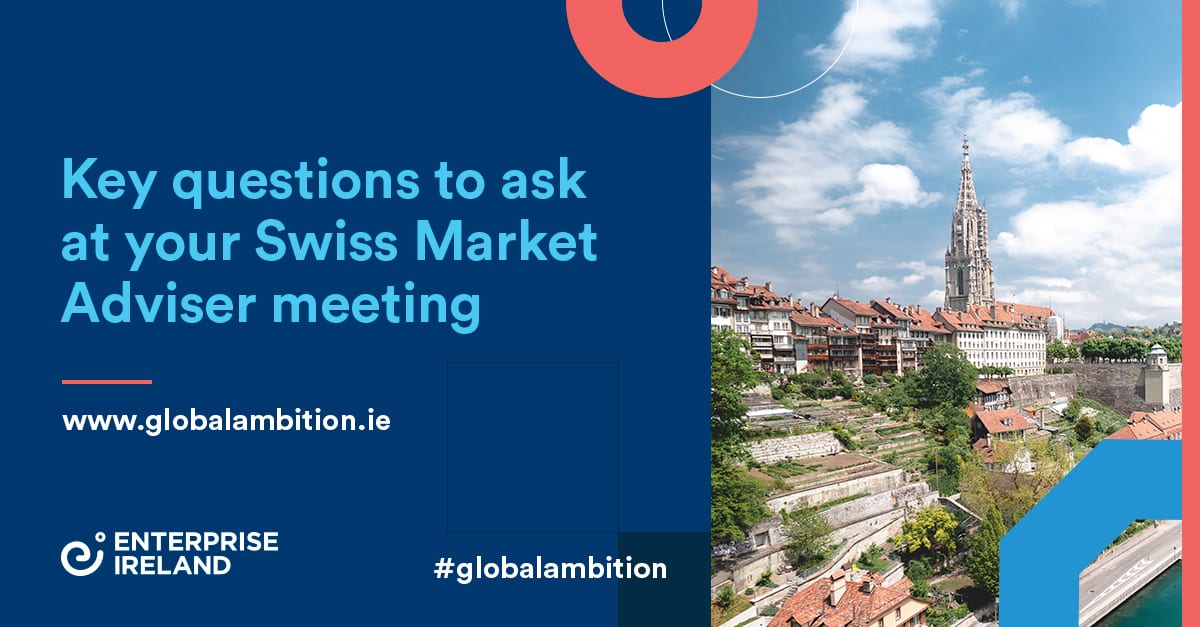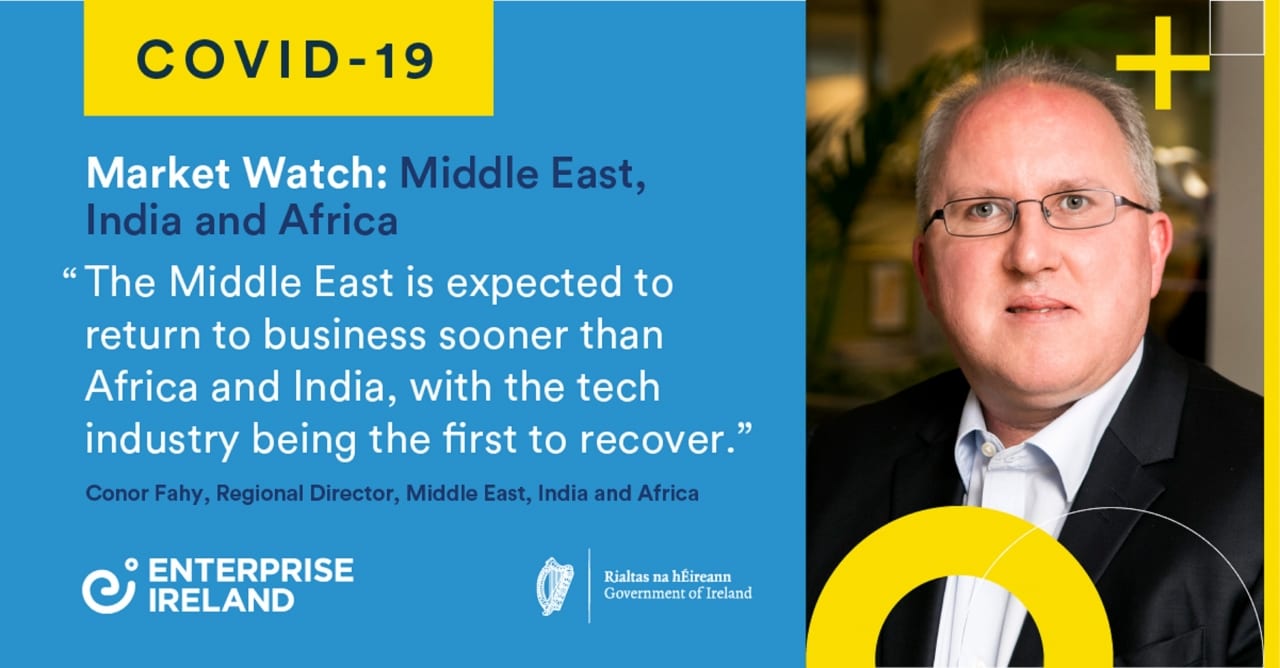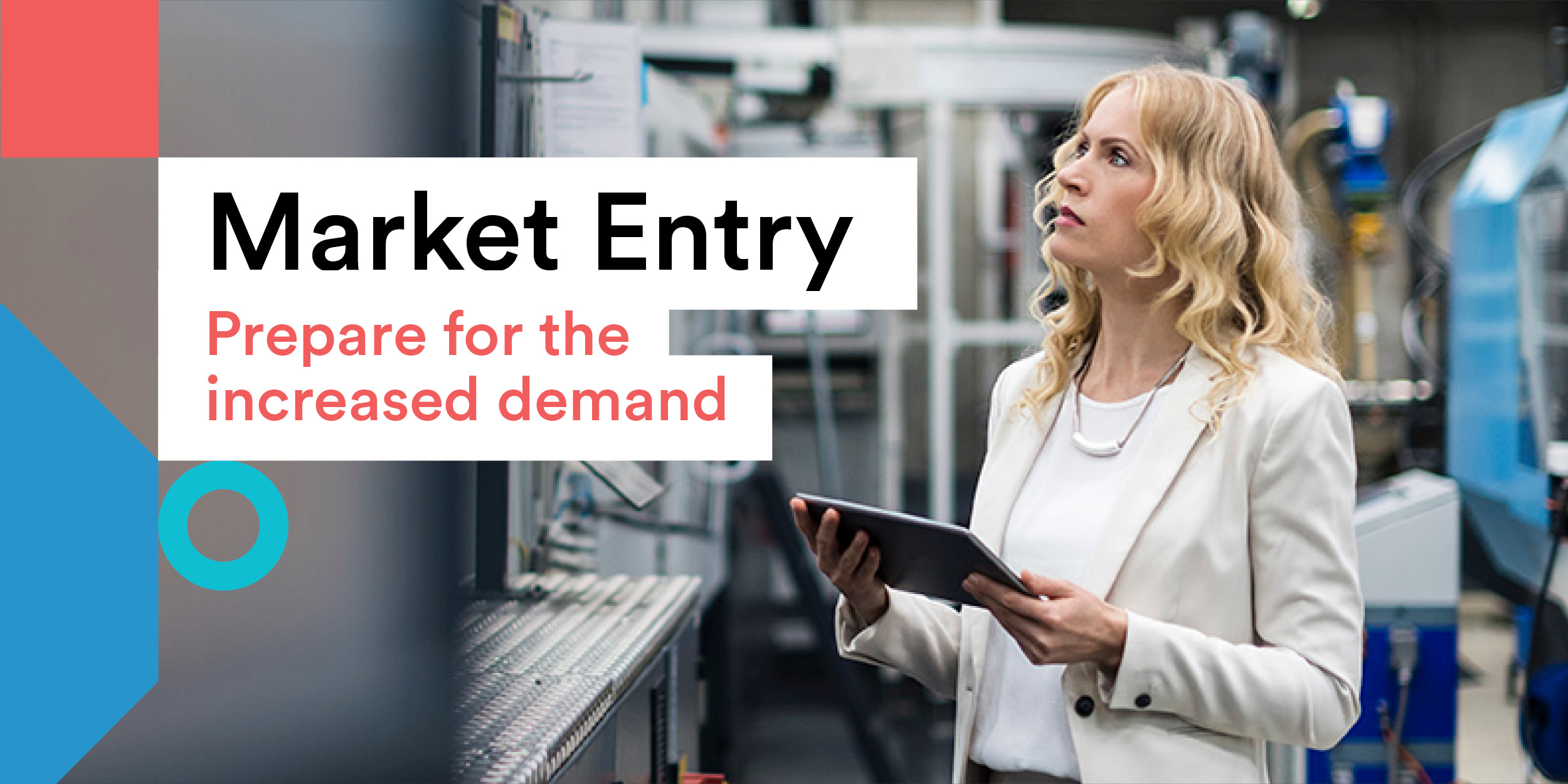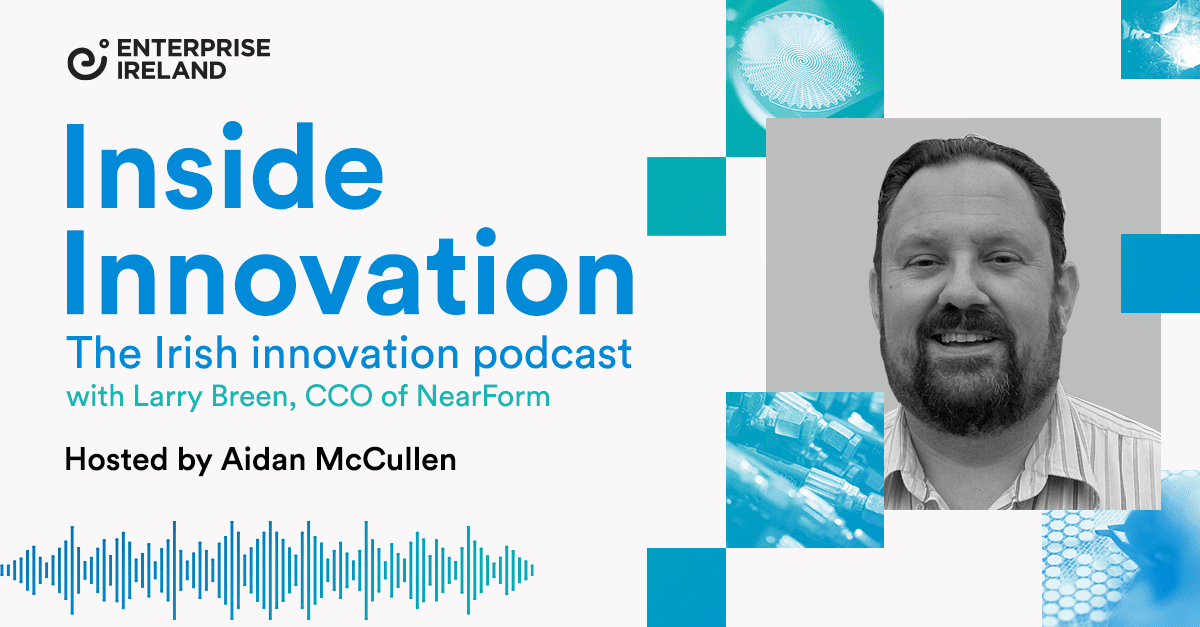Evolve UK – NHS procurements and frameworks webinar
A spell in Australia running their own small construction business gave brothers Ciaran and Niall Brennan an insight into one of the major issues for smaller construction companies today. “We really struggled to see where we won and lost money on our projects,” he explains. “We essentially decided to design our own system to overcome this issue; we built this quite well and ended up selling the construction business, with the intention of pursuing what we perceived as a bigger opportunity in the industry.”
With the help of Enterprise Ireland’s Competitive Start Fund (CSF), Ciaran and Niall developed their cost-tracking software into a real solution for small and medium-sized businesses in the sector. “Ninety per cent of the companies that we first meet are using Excel spreadsheets to track costs,” says Ciaran. “The top end of the industry uses very sophisticated technology to track costs; these systems are expensive but they can afford them. Coins is a great example of a construction software company that has been around for a very long time. The smaller end of the sector simply can’t afford these systems, and they end up using accounting systems and Excel. These require a lot of manual entry, which is open to error. There also tends to be some duplication of information.
“In essence, we’ve made sophisticated technology available to small and medium-sized businesses. We offer an affordable alternative to costly solutions like Coins.”
When the brothers recognised that their system had the potential to disrupt the construction software industry in Ireland, their first port of call was Enterprise Ireland and their New Frontiers programme, which led into their application for the CSF. Interestingly, they were the first company to embark on Phase 1 of the New Frontiers programme remotely, as they were still in Australia when they began the programme.
“The New Frontiers scheme gave us our first taste of the Irish start-up scene,” says Ciaran. “It gave us six months to evaluate if we had something or not. The programme really challenged us to ask those questions and see if the idea could become a viable business. The business was then officially launched in January 2018.”
From then on, plans for the business accelerated. “We applied for the CSF in April 2018. We had actually applied for it twice before, but the feedback we got was to complete the New Frontiers programme first.
The questions asked help you focus on what you want to achieve over the next 12 months and further, and how you’re going to achieve this with or without CSF funding.”
The funding from the CSF, alongside another investment, allowed LiveCosts to develop their software, and turn their fledgling prototype into a real business. In essence, the CSF allowed LiveCosts to become an ambitious and viable company. LiveCosts now have clients in Ireland, the UK, Australia, New Zealand and South Africa. “The funding also allowed Niall to come onboard to work alongside me, so we could develop the business side further too.”
Receiving the funding from the CSF came just before a challenging time for every industry – Covid-19 and Brexit. Being able to build their business just before these two issues allowed the company to overcome the obstacles and even see the opportunities that come from such huge challenges.
Thankfully for LiveCosts, the impact of Covid-19 was not as hard as for other companies. “Essential construction continued during lockdown so our customers were still operating,” says Ciaran. “Our role is to tell companies if they are making money or not. A lot of companies in the current climate are very worried about their projects given the current uncertainty; we help to give them clarity around this issue, so interest levels and new customers have stayed high during the pandemic.
Brexit, however, was another story. “Brexit has created a problem around the supply of materials. There’s also issues around the fluctuation of prices for materials on projects that have already been awarded. In addition, there are delays in the supply of materials, particularly those coming from Asia. Any impact on construction projects is going to have an impact on us. If it slows down projects, it slows down decision times on getting us involved on projects. I see these as big challenges for the business and the sector in the future.”
But out of issues come new opportunities, and Ciaran sees a big future for the company. “We’ve seen a huge shift in procurement and how we buy materials in the construction industry. Covid-19 has accelerated this; we’ve been looking at ecommerce and how it can work in construction. Our biggest opportunity is to capitalise on the work we’ve done to date, and the head start we have in that particular area, to make this happen. We’ve started to connect some of the big brands to make buying materials a far more efficient process.
“Construction is quite a complicated industry, it relies heavily on credit, so something like Amazon would not work. Specifications would be another complexity. Someone will eventually come along and figure this out, and we believe that this will happen from someone within the industry who understands these complexities. We believe the answer is a digital procurement system, and this is what we are working to achieve.”
The Covid-19 pandemic has hit few sectors harder than the aviation industry, with severe restrictions on travel and closed borders resulting in a dramatic decline in passenger volumes globally. Airports around the world have had their resilience tested to the limit as they faced the initial paralysis of the skies, followed by the ongoing waves of the pandemic. However, there is a glimmer of light on the horizon driven by the rollout of the global vaccination programme in the majority of countries, albeit at different levels of implementation.
Despite the significantly curtailed demand globally and regionally due to Covid-19, the International Air Transport Association (IATA) predicts the Middle East will see a 4.4 percent growth in passenger journeys over the period through to 2039. “With the Gulf Cooperation Council (GCC) home to some of the most advanced airports in the world and often exceling in passenger service, they are on the front foot to ensure restored confidence in flying once again,” said Alan O’ Mahony, Market Advisor for the Middle East and North Africa (MENA) region at Enterprise Ireland.
“Airport operators and airlines are monitoring the situation closely and continue to adapt to the evolving situation. They are now faced with the challenge of balancing additional health and safety requirements with providing a good passenger experience as they seek to restore confidence in air travel. Innovation and technology across the Middle East will play a key role in unlocking improvements for passenger experience and safety whilst also igniting the recovery for the sector. Ireland has forged a strong reputation for delivering world-leading innovative solutions that are used every day by the largest airlines in the world and across the wider aviation sector. We need this innovation now more than ever to power the industry’s recovery and Irish companies will continue to shape this new age for air travel.”
Technology has advanced swiftly over the course of the pandemic in reaction to the ever-changing environment, and a new focus on health considerations in technology and process transformation has emerged.
“One trend that will become more widespread is the adoption of contactless technology in order to minimise the spread of viruses and reduce interaction between staff and passengers throughout the entire journey,” explained Alan. “A good case in point is Irish company IO Systems which operates the automated baggage return tray systems in Dubai International Airport. The company has adapted its latest models to include blue light cleansing technology to ensure their trays are actively cleaned as they automatically return through the baggage system. Airports can ensure additional safety measures are applied whilst still ensuring a good passenger experience is delivered through the introduction of these type of innovative solutions.”
“The hot topic in the industry right now is the digital health certification to capture the completed vaccination process or Covid-19 status of people intending to fly,” said Alan. “Irish biometric identity assurance specialist Daon is leading the way by creating the world’s first widely adopted mobile health passport to help those eligible to travel to navigate the changing entry requirements associated with Covid-19. The company’s new VeriFLY app, which has already been adopted by American Airlines, British Airways, Iberia Airlines and Aer Lingus, is designed to offer peace of mind before travel by ensuring passengers meet the entry requirements of their destination.”
VeriFLY provides digital health document verification, confirms eligibility, and allows people to combine necessary travel documents, such as Covid-19 test results, in one place, allowing travellers to ensure they are fully compliant with all the departure and arrival requirements before leaving home. Certified customers will be fast-tracked through the airport where specially designated desks are available for check in.
“The ingenuity, ambition, and adaptability that Daon and their partners have demonstrated throughout the pandemic are making a significant contribution to restoring traveller confidence and ensuring a positive passenger experience. It’s just one example of how innovation from Ireland, one of the major travel tech hubs in the world, is playing a leading role in the recovery for the sector.”
Responses to Covid-19 have accelerated the adoption of digital technologies across almost all sectors, and it’s thought that many of these changes will have a lasting impact. “With the global smart airports market to top $22.6 billion (USD) by 2025, the requirement for advanced technologies – especially as part of the immediate recovery – will continue to be an important market for the vast array of Irish companies operating in the sector. We are likely to see new entrants into the airport space across technologies such as biometrics, robotics, cloud technologies and IoT.”
“There is no doubt that the Covid-19 crisis has had a devastating impact on the air travel industry and the recovery for the industry is still some distance away. With that said, recent trends offer reasons for cautious optimism. While it’s certain that air travel will never look the same again, these innovative solutions will help to ensure international airline travel is, once more, cleared for take-off.”

If you are considering doing business in Switzerland, your first step should be a call with our dedicated team.
Enterprise Ireland is committed to helping Irish firms succeed in global markets and have industry experts on hand, ready to help you access the Swiss market.
Our Market Advisors are always available to support you and provide business expertise and on-the-ground knowledge.
For more, download our Going Global Guide

Key Takeaways
The global pandemic has indeed affected every corner of the world and according to Conor Fahy, Regional Director, Enterprise Ireland, India, the Middle East, and Africa is no different.
“The area encompasses over 40% of the world population so lockdown and self-isolation presents many challenges,” says the regional director. “The situation in the Middle East is similar to Europe in timing and response and most companies are expecting a decrease in revenue and are looking to cut costs and consider cost containment and defer or pause investments.
“The double whammy of an oil price war and Covid-19 will affect budgets and Dubai has introduced highly restrictive measures, including closing its airport, so there is a risk of a sharp increase in business defaults and liquidations in the travel and tourism industry. Also borders have closed across the region and major international events have been cancelled or delayed.
“India and Africa are currently around three weeks behind in terms of cases and government response. But business is severely affected, while economic activity is suffering from the initial phases of lockdown. The medium-term impacts will be severe and combined with oil-price shock and reduced demand for commodities, the region is likely to tip into an economic contraction in 2020/21, in the absence of major fiscal stimulus.”
There are eight Enterprise Ireland offices across the region which are helping Irish companies stay informed, connected and exporting. And Fahy says it’s crucial for people to avail of this support and keep communications lines open in order to survive the challenges.
“When things get tough, the temptation is to become acutely focused on immediate problems but while these should be addressed, developing a strategy for recovery is just as vital. So extend your timeline assumptions and planning-against scenarios, even if it appears difficult. Now is the time to invest in strategic planning and to start thinking through decision criteria and conditions for return to business.”
Many organisations are still dealing with immediate concerns around the availability of cash.
While all sectors are being affected across the region, Tourism, Aviation, Construction, Industrial Manufacturing and Mining and Oil industries have been hardest hit but technology related businesses will be the first to make a recovery.
“CFOs in the Middle East are expecting to get back to normal sooner rather than later; pausing or delaying investments instead of cancelling them altogether,” he says. “In fact, the majority expect to return to business as usual within three months if COVID-19 were to end today.
While there are certainly challenges facing Irish exporters, Fahy says there are also some emerging opportunities, particularly for digital payments and cloud services.
“The near collapse of many online grocery retail platforms is driving demand for process automation and intelligent self-service and Irish companies quickly recognize the changing market dynamics,” he says. “But while positivity may be in short supply, there is optimism in around returning to business and continuing to invest where it matters.
“Business leaders need to invest time away from crisis management to show leadership and strategically look to future opportunities which will emerge when these economies rebound.”
Companies around the world are looking to Irish talent tech companies for cutting-edge digital solutions to enable streamlined, effective work by HR departments, managers and employees. From wellbeing apps to performance management tools, Irish companies are exporting best-in-class products to businesses in dozens of countries.
Most are also focused on integrating with the existing technologies used by companies, meaning those in charge of IT budgets can maximise their legacy investments. Discover how five of the best in Irish talent tech are meeting the needs of a global client base.
Cork-based Workvivo is an enterprise social network, designed to enable organisations to engage as well as communicate with their employee communities.
“We took activities such as posting, liking and sharing content to an activity feed, which people are used to on social media apps outside the workplace, but developed them in a business context, enabling people to more easily engage with one another and with their company.” says Pete Rawlinson, Chief Marketing Officer at Workvivo.
“Disengagement was an issue for as many as 70% of businesses before the pandemic,” he adds. “One-to-one communication tools such as email or messaging facilitate communication but don’t do anything to provide that sense of community and culture.”
Since the pandemic spread, Workvivo has seen a significant increase in enquiries. “Companies are seeing that many remote workers can feel isolated. Our platform helps bring employees together through a highly social experience. We see customers using the platform to host activities such as quizzes and competitions that really help create that important sense of community….and fun!”
Woodies found that its Workvivo activity went up when its workers were furloughed due to Covid-19. “These were mainly employees with no work email account or company device, but they wanted to stay engaged,” says Rawlinson.
Workvivo has sought to ensure it can integrate with existing communication tools such as Slack, Zoom and Workday, and also includes built-in engagement analysis through pulse surveys, he says, adding that many customers report higher levels of employee satisfaction and engagement than before they implemented the platform. “Higher engagement typically leads to increases in talent retention and acquisition,” he said.
Established three years ago, Workvivo now has customers in 35 countries with over 150,000 users on the platform. The company is headquartered in Cork, Ireland and has recently opened an office in Sacramento, California. Having recently secured $16m (€14.2m) in Series A funding, it is now focused on expanding its US client base and accelerating its product development plans.
While performance review cycles can strike dread into both managers and employees, Frankli aims to make performance management easier and more intuitive with its end-to-end platform.
“Our product allows managers to have much more meaningful conversations with people and support their development,” says Noel Dykes, founder and CEO of Frankli. “This approach is transformative and agile — we don’t set out to be a once-a-year annual cycle of goal-setting and meetings.”
A software engineer by background, Dykes worked as a consultancy practice manager in New Zealand and saw first-hand that younger employees were particularly keen on continuous feedback and recognition. “People want to be truly connected to the work,” he says. “They want to understand their purpose. Why are they there? What is the company they are working for trying to achieve?”
He adds that purpose-driven organisations will thrive, especially as remote working opens up a global marketplace.
“Managers are going to become coaches, rather than engaging in direct management in the office where they can see employees and know what they are working on. From now on, they will have to trust people and give them much more autonomy.”
Within Frankli, managers can set up regular recurring one-to-one meetings with their team members, setting priorities, agreeing action items and supporting accountability on both sides. The software suggests recommended talking points, based on insights from organisational psychology. Employees can also contribute comments and suggestions.
The product also enables businesses to offer more tailored learning and development opportunities, including a two-sided mentor marketplace tool.
Frankli has customers of all sizes in Ireland, the UK, Poland and New Zealand. While its core focus is midsize companies looking to scale, it already supports workforces of as many as 70,000 employees.
While many employee wellbeing platforms work on a one-to-many scale, says Sohini De, founder of data-driven start-up Empeal, her business aims to deliver 1:1 wellbeing support at scale.
“If someone is having trouble with sleep, perhaps not doing too much exercise, eating unhealthy food or generally falling into bad habits, they can go through the programme on our system,” she explains.
“They start by completing interactive questionnaires and we can also integrate data from their wearable devices. They could be given a personalised programme to improve their sleep hygiene, for example. If they continue to have problems, their case is escalated to a sleep expert.”
With users in Ireland and India, Empeal is now focused on expanding those markets and pushing into both the UAE and the UK, So far, it has seen engagement rates of 60% on average, which De says is high for a wellbeing app. “We have also seen very encouraging results in terms of people achieving their health goals,” she says.
In addition to helping employees improve their wellbeing, Empeal also provides anonymised aggregate data to employers to enable them make better decisions, improve staff retention rates and attract more talent.
To help companies navigate the coronavirus crisis, Empeal produced a free toolkit of resources and also made its community-level module free. “We were finding a lot of employers were asking, ‘How can we take care of our people at this time?’ — they were very concerned about how everyone in remote locations was coping not in touch with their workplace or workmates,” says De.
The three founders of workplace wellbeing platform Peptalk — all former sports stars — know more than most the value of wellbeing when it comes to performance.
“We had all been involved in high performance sports,” says CEO James Brogan, an all-Ireland winner himself and a cousin of Dublin GAA legend Bernard Brogan, another of the co-founders along with Michelle Fogarty, who represented Ireland at taekwondo. “We had seen that to get the best out of people, their lives need to be in balance. What you do off the pitch is as important as what you do on it.”
Peptalk aims to help companies build sustainable high performance cultures through its community-driven employee experience platform. The product includes an insights tool, management toolkits, an employee app and a real-time measurement dashboard.
“We’re helping organisations with those off-the-pitch activities. We’re helping humans to be better at what they do, to have more energy, and to be more focused and resilient,” says Brogan.
He adds that the Covid-19 crisis has exacerbated the issue of work-life balance: “Senior leaders have seen a different side to their staff. They’re now acutely aware that, unless people have proper support, they won’t be able to work to the best of their ability.”
During the crisis, Peptalk has seen increased engagement from existing clients, while also doubling its usual number of demos to potential customers.
Set up in late 2016, Peptalk has users in 10 countries, including Mondelez, McDonald’s and Paypal. “This is a global challenge faced by multinationals. We offer one solution that works across an organisation, so there is no sense of disconnection with different offices doing different things,” says Brogan.
With serious plans to scale further, Peptalk expects to close out its current funding round later in 2020. “This is the time for us to get out and support as many organisations as we can,” says Brogan. “It’s a challenging time and the need has never been greater for the type of services we offer.”
Founded two decades ago, Wrkit was originally a group benefits scheme, which evolved into an employee discount scheme. While users can still access thousands of discounts on holidays, food, clothes and other products, Wrkit has expanded to offer other services, including a learning portal with 4,500 personal and professional courses, a recognition portal and a wellbeing portal called Powr.
“POWR stands for Positive Occupational Wellness Resources, offering tools such as meditation, breathing exercises and reflective journaling” explains Jason Brennan, Wrkit’s Director of Wellbeing and Leadership.
“The big differentiator between Powr and similar apps is that it offers 430 clinically based behavioural plans put together by psychologists,” says Brennan. “These are based on six paths — mind, sleep, work, life, food and active. When users answer the questionnaires for these paths, they are given a personalised plan.”
“POWR users begin by finding out how they score clinically in the 6 areas of wellbeing and are instantly provided with personalised clinically based plans to improve engagement and growth in each area. During covid for example we saw a huge up take in the activity, work and life plans, helping not only users but employers by feeding back what is happening in real time with their anonymised and aggregated dashboard.”
Wrkit is based in Dublin, but also has offices in London and Massachusetts. Its clients include multinationals such as KPMG, FedEx and Boston Scientific. Its internet-based application can be launched quickly as it requires no specific IT infrastructure, says Brennan.
“All we need to launch is the list of employee ID numbers, and we provide lots of webinars and video tutorials to help staff engage with the tool, which is of course completely confidential.”
When Covid-19 struck, Wrkit quickly found demand rose. “We launched to 60 companies in eight weeks,” says Brennan. “We also quickly created a Coping with Covid portal to help users.”

Will your customers be a distributor which imports in larger quantities, or an overseas agenct or representative acting on your behalf or will it be a separate trading company of your own business?
Supports will need to be assigned to generate business leads. Will they be predominantly offline, online or a hybrid?
Offline: fairs, events, conferences, network meetings or
Online: website, social media, blogs etc.
You will need to qualify and validate the leads, managing them through a Customer Relationship Management (CMS) system such as Salesforce.
Implementing a successful marketing and communication plan is vital for sustained sales in export markets.
When developing a plan, it is important not to do a ‘copy and paste’ of the same marketing strategy from your domestic market as these are likely completely disparate territories. While it is logical that you should retain your company values and purpose, you will need to adapt your marketing and communications strategy to your new export market
By implementing a sales process, you are creating a set of logical, repeatable steps that your sales team goes through to bring a potential buyer from an early stage of awareness to closing the sale. There are various stages that need to be considered in developing an effective sales process, such as;
a) How will your company cultivate your sales leads?
b) What preparation will you commit to in order to be ready to capture an overseas sale?
c) What will be your sales teams approach to a prospective buyer?
d) How will you adequately present or pitch your sales in an overseas market?
e) Is your team setup to deal with buyer objections or queries?
f) Have you experience in closing a sale in an overseas market?
g) What follow-up work will be done post buyer presentation?
Relationship building is a key factor in developing sustained sales in export markets. Any company considering to expand globally is undoubtedly looking for a return on their initial investment, and companies looking for better business returns are strongly encouraged to place an emphasis on relationship building.
Companies can quite often focus on the transactional, revenue generation portion before they consider relationship building. However, as is the case in much of the world, relationships based on mutual respect and trust outplay singular transactions. Relationships need to be worked on and require different approaches for different markets.

“Business is definitely getting back to some semblance of normality, but things are a little different,” says Ryan. “In Singapore, we are now in Phase 2 of the ‘Circuit-Breaker’ measures and most businesses are now allowed to return to office environments. But the message remains consistent and to work from home where possible.
“Politically there is a history of stability and longevity here with governments making long-term plans which are carried on by successive ruling parties and this is very beneficial to the economy of the region.”
With experience of the SARS epidemic in 2002-2004, the governments of SE Asia have been methodical in their management of the Covid outbreak and this has proved crucial in the successful reopening of business.
“During the phased approach, the return to work was carefully managed,” says Ryan. “And around the region, key markets are opening up and demonstrating strong ownership in managing business and movement of goods.”
So with the effects of Covid shaping how people work and interact, the ASEAN director says strong sectoral opportunities have emerged.
“From the Life Sciences sector, there is significant interest and demand for services which offer innovative solutions to help eliminate the effects of Covid. And the crisis has shown how reliable technology can be and has forced governments to take a fresh look at implementing digital health solutions in their regions.
“Consumer Retail is also playing out strongly with the likes of Water Wipes and Pestle & Mortar being two good examples of clients gaining traction in Asia.”
But most businesses, regardless of sector, are focused on saving cost, generating additional ancillary revenue streams and using technology to help prevent Covid in the workplace.
“Businesses are very keen to understand how technology can help them combat the pandemic and keep staff safe,” says Ryan. “We’ve had strong engagement with companies who see the value proposition, most notably with the likes of Novaerus who have a proven air and surface disinfection device. While companies such as Combilift have proven capabilities in an industrial space, helping to eliminate waste and enabling companies think more efficiently.
But one of the real strengths of Enterprise Ireland is its network overseas.
“We are the gatekeepers making sure clients are ready to make the leap,” says Ryan. “We also work with them to break down any barriers – geographically and culturally.
“So on a positive note, we’re definitely seeing greater availability and access. Prospective buyers in the region are realising that unless they open their minds and are willing to think innovatively, they will face the prospect of losing opportunities to their competitors, and in this climate that could prove fatal. Irish companies have a long history of being innovative and entrepreneurial and business in Asia is very responsive to this.”
The SE Asia region encompasses 10 countries with a population of circa. 650m people and Ryan says the market is very much open with he and his team engaging regularly with client companies to support a successful entry into the region.
“Ireland, in comparison to some parts of Asia, is small, and our team works extremely hard on selling a consistent Irish message,” he says. “We have strong success in opening doors and creating opportunities and our reputation across the globe is superb with Ireland’s expertise in Asia shining through from the perspective of innovation and quality.
“So there is light at the end of the tunnel, and we’re encouraging clients who have a product ready to go, to engage in Asia as we are laying the groundwork for opportunities to be realised in 2021 and beyond.”

 Enterprise Ireland hosted a series of Global Ambition – Industry Insights sector focused webinars to deliver market intelligence on the evolving international export opportunities across global markets.
Enterprise Ireland hosted a series of Global Ambition – Industry Insights sector focused webinars to deliver market intelligence on the evolving international export opportunities across global markets.